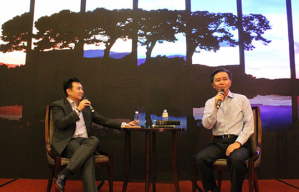
The head of the world's largest plastic pipe manufacturer was recently interviewed on his viewpoints toward work, money, family, faith and values.
Walter Wang (Wang Wenxiang), president of PVC Corporation (Taiwan JM Eagle Group), is the son of the late Wang Yung-Ching, the former wealthiest man in Taiwan, who was known as the "god of management" and founder of Formosa Plastic Group.
Mr. Wang bought his father's company in 2005 with a price that is 10 percent higher than the market value and turned it from a company with less than two hundred million operating value to one with over one billion dollars.
As a devout Christian, Mr. Wang was interviewed by an influential Taiwanese pastor Guolun Huang at the "Enterprise and Eternity" 2013 Business Summit that was held in Shenzhen, China, from Oct. 10-13th.
Huang: Your father knew so much about how to run a business. What lessons and help did he give you, and what did you learn from him?
Wang: My father sets a good example in that he does not just speak and not do. All these years, I have seen him work every day until nine or ten o'clock. He taught me to use actions as an example, and that one day, if I am fortunate enough to become a leader, I must work harder than the employees, especially within the production industry. I must understand the cost of every penny. So I think leading by example is very important.
Also, when something happens, you need to dig deep down level by level into the deepest level, and then try to understand the root cause. So, leading by example and digging deep to the root are two points that have the most profound effect on me.
Huang: When your father wants you to work in the Formosa factory, did you really start from the lowest level? Please share with us about your life experiences.
Wang: I got used to the California weather where there was year-round warm weather. So once I was back home, I felt very hot. I was very thin at that time, and I had to do shiftwork as an average worker operating machines. I even ate my lunch in the midst of the machines. I had to sweep the floor and wash the toilet. I did not like my job, since every day I would be sweating profusely. Also, shift work was draining, and I often felt very tired at around 3 or 4 am.
But looking back after these 3 or 4 years, I felt very grateful to my father. If I did not go through this period of training, it would be difficult to obtain the respect of employees even if the company belonged to me, just because I would not be able to understand their feelings and experiences. So I am very grateful to my father to have let me experience life and work.
Huang: Business and Management Studies seldom refer to "suffering" as an important aspect of learning. Would all entrepreneurs have to go through hardships to become successful?
Wang: People must experience hardships first before they taste sweetness, because the greater the suffering and storms, the stronger people will become. Life is not always smooth with no storms and challenges; so people must suffer first, and then after the suffering, the sweetness will become even "sweeter". For example, if we are well fed every day, it is easy to become picky in taste, and even good food becomes less good. On the contrary if you've been hungry for two or three days, everything becomes tasty. And thus, I think people must experience hardships.
I love my children, but I have to let them suffer. When my son was attending junior high and high school, I often urged him to go out and work, so he worked almost every summer. I was mentioning Africa, and in fact, I especially wanted to take my children to the poorest regions of Africa, so that they can experience the local life and understand the happiness that they possess. Thus, I encourage all parents to bring their kids to more of these places.
To be cont'd...
[Editor's note: Carol Lee contributed to the article.]
Interview: Billionaire Walter Wang on Family, Career, Kingdom of God, Part II






